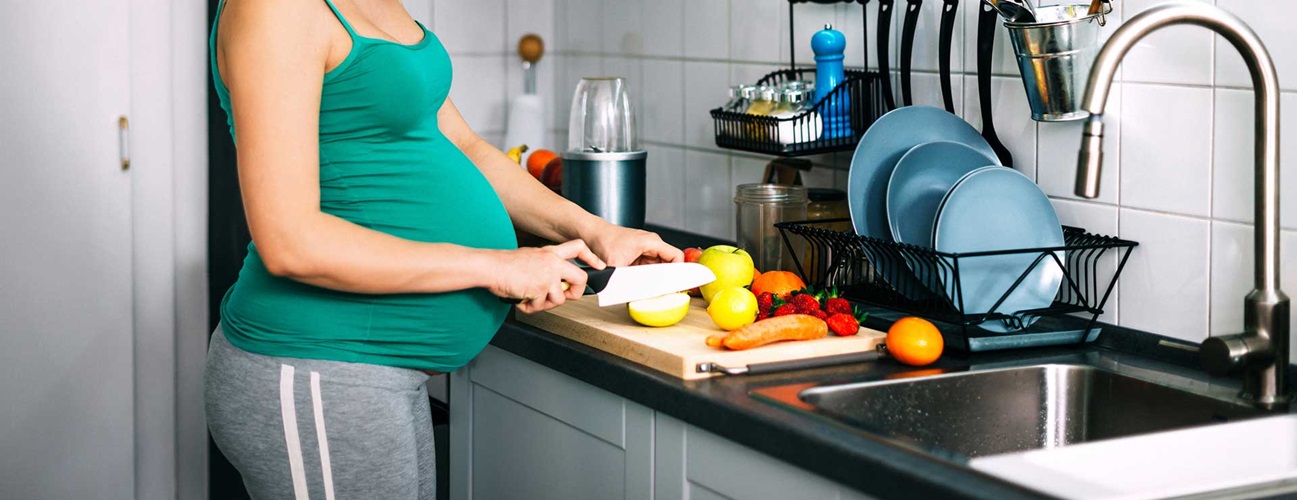Food and nutrition

Key information on this page includes:
A healthy and balanced diet
Eating well during pregnancy is really important for you and your baby. You don't have to follow a fancy diet, but you should eat a mix of different foods every day to make sure you both get the right stuff. This means fruits, vegetables, proteins and grains.
Most of your vitamins and minerals should come from your food. But when you're pregnant, it's a good idea to take a folic acid pill to be extra sure your baby gets all the right things to grow well.
Vitamins and supplements
During pregnancy, it's vital to eat a healthy balanced diet to get the necessary vitamins and minerals. However, taking some supplements is also important for the health of both you and your baby.
- Folic acid - Its recommended to take 400 micrograms of folic acid every day, starting before you become pregnant and continuing until you're 12 weeks into your pregnancy. This helps reduce the risk of problems in your baby's early development.
- Vitamin D - Taking a daily vitamin D supplement is also advised to ensure you get enough of this essential vitamin. Vitamin D is important for your baby's bone and teeth development.
Do not take cod liver oil or any supplements containing vitamin A (retinol) during pregnancy. Too much vitamin A can be harmful to your baby.
Always check the label on any supplements you consider taking during pregnancy, and consult with your healthcare provider to ensure you're making the right choices for your specific needs.
Free healthy start vitamins
Under the Healthy Start scheme you are automatically entitled to free vitamin tables when you are pregnant and up to your baby's first birthday. They contain:
- Folic acid.
- Vitamin C.
- Vitamin D.
You can collect the vitamins from your nearest Family Hub and other locations - use the checker to see where your nearest collection point is.
Foods to avoid in pregnancy
Most foods are safe to have during pregnancy. But, there are some things you should take extra care with or avoid completely.
|
Food type
|
Food to be careful with
|
Food to avoid
|
|---|---|---|
| Dairy |
Any food made with unpasteurised milk such as mould ripened soft cheese.
Blue cheeses.
Unpasteurised milks and creams.
|
|
| Meats |
Cured meats such as pepperoni and chorizo - unless cooked.
|
Raw and 'rare' meats.
Liver or liver products.
Pates.
Game meats like pheasant.
|
| Eggs |
Raw or partially cooked eggs.
|
|
| Fish |
You need to ensure that fish products are thoroughly cooked.
You should only have two portions of oily fish per week e.g. mackerel.
You should also limit the amount of tuna to around four tins per week.
|
|
| Other foods |
Caffeine should be limited to two cups of tea, herbal tea or one cup of coffee per day - remember there can also be caffeine in fizzy drinks!
Fruits and vegetables - make sure that you wash raw fruit and veg before use to get rid of dirt.
|
Alcohol.
Liquorice root.
|
Tips for healthy eating during pregnancy
- Base your meals on starchy foods: build your meals around foods like potatoes, bread, rice and pasta. Have wholegrain options where possible.
- Eat plenty of fruits and vegetables: aim for at least five different portions of fruits and vegetables daily. Keep in mind that potatoes and fruit juice don't count as multiple portions.
- Minimise fried and sugary foods: limit fried foods and steer clear of sugary drinks, sweets, cakes and biscuits. Instead, focus on fibre-rich foods like oats, beans, lentils, grains and seeds.
- Include protein daily: eat protein daily. Aim for lean meats and have fish at least twice a week. If you don't eat meat or fish, consider alternatives like lentils, beans, nuts, eggs and tofu.
- Choose healthy snacks: when you're hungry between meals, go for healthier snacks like vegetables, small sandwiches, or fresh and dried fruits.
- Dairy or dairy alternatives: incorporate dairy products for calcium. If you prefer dairy alternatives, make sure they're calcium-rich and unsweetened.
- Portion control: be mindful of portion sizes for meals and snacks. Avoid the idea of "eating for two".
- Don't skip breakfast: eating breakfast is essential for your energy and overall nutrition.
- Limit caffeine: keep your caffeine intake to a minimum, ideally less than 200 milligrams per day, which is about two mugs of instant coffee. Be aware that tea and energy drinks also contain caffeine. Consider switching to decaffeinated versions, as high caffeine intake during pregnancy can lead to complications like low birth weight, miscarriage, and stillbirth.
- Calorie intake: in the first six months of pregnancy, most women don't need extra calories. In the last twelve weeks, you may need around 200 extra calories a day, roughly equivalent to two slices of bread.
Remember that these guidelines can help ensure a healthy pregnancy, but it's always a good idea to consult with a healthcare provider or midwife for personalised advice or concerns during pregnancy.
Healthy start vouchers
You may be entitled to healthy start vouchers. These can be used to buy milk, and fresh and frozen fruit and vegetables in local shops. You can also get vouchers for free vitamins: Find out if you are entitled to healthy start vouchers.
Local activities
Stoke-on-Trent Family Hub has partnered with the Solihull Approach to offer free access to expertly designed online courses for parents, carers, grandparents and teens living in the region. Click here to sign up and to access the course you need: In our place - Stoke-on-Trent.
